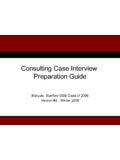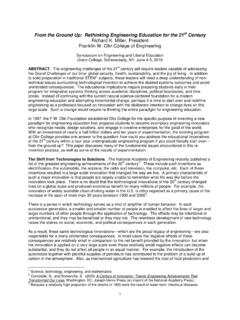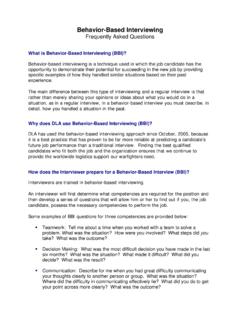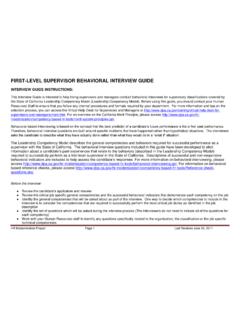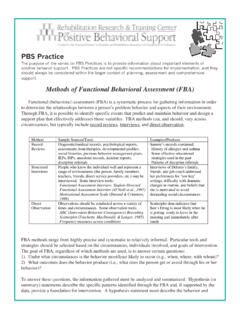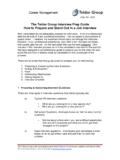Transcription of INTERVIEWING SKILLS AND TECHNIQUES Goals of an …
1 INTERVIEWING SKILLS AND TECHNIQUES Goals of an interview Goal of the Interviewer It is also important to consider whom you are talking to. The human resources person is the one likely to know about job descriptions, qualities being sought and the morale or company culture. The hiring manager, your future boss, is the person to ask about the department, the team you will be working with and the job's challenges. Goal of the Interviewee Be prepared to talk about your successes and experiences. The employer will want to find out about your past experience successes and failures, your work ethic, your track record Types of Interviews First /Screen The first round of interviews is about discovery, learning about the job and the company, not the benefits or raises.
2 Second In this round the candidate is usually exposed to more people and details of the company and the position. This also gives the company an opportunity to explore in depth the SKILLS , experience and cultural fit of the candidate. Phone In many ways, the way you prepare for a phone interview isn t all that different from the way you d get ready for a face to face interview save for a few slight additions to and modifications of your list of preparation tasks. Behavioral o When asked a traditional question like, "What would you do if you had a customer who wasn't interested in buying the product?
3 " you can make up a story. But when you are asked behavioral questions, the interviewer is listening for specific examples of how you have handled situations or problems in the past. o Behavioral questions begin with phrases like, "tell me about a time when," or "can you give me an example of." The interviewer wants to hear your real life examples. Your success stories should include the situation, the action you took and the result. Individual A one on one situation with the style varying from interviewer to interviewer. Group/Panel Board or panel interviews are usually rather formal and organized, using a standard set of questions for all applicants.
4 Preparation Preparation builds confidence. Research o Job Description Look at the job description and compare the company's needs with your experience and qualities. o History of Company Search company Web sites for mission statements, product and service information, principals' backgrounds and contact information. Check company financials through the US Securities and Exchange Commission. o Work history/relevant experience Review what you did at previous jobs or in an educational environment so you can tie it in to what you can bring to the new company.
5 Preparing Answers o Rehearse your answers. Write them down as a script and recite them in front of a mirror. Have backup answers, too. You'll come across as being more confident. Preparing Questions The questions you ask, and how you ask them, do as much to differentiate you from the competition as the questions asked by the interviewer. Practice The best thing you can do is practice, practice and practice some more. The only one who knows you and can sell you is you. Your goal should be to effectively display the following qualities: capability, confidence, dependability, enthusiasm, flexibility, resourcefulness and strong work ethic.
6 Be sure to look at typical interview questions, as well as good questions to ask and what not to ask. Attitude/Behavior Be positive o If you have the attitude of wanting to do your very best for the company, of being focused on the company's needs, of putting yourself forth as the person who will be committed and dedicated to fulfilling their needs, you will likely be the one chosen. Listen o Listening tells the interviewer you have heard what was said and sometimes what was not said. The best questions you can ask come from listening. Closing the interview If you are truly interested in the job, at the end of the interview be sure to: o Recap why you feel you are the best candidate for the job (give two or three of your strongest attributes and/or qualifications) o Restate your interest in the position by asking for the job.
7
